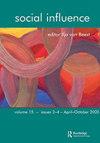咨询他人是否会影响对难题的可回答性判断?
IF 0.6
3区 心理学
Q3 PSYCHOLOGY, SOCIAL
引用次数: 5
摘要
人们对与世界上的事物如何相关的问题的可回答性的判断会对社会和人们的生活产生重要的影响。31个人和30对对20个常识问题进行可答性判断,其中许多问题的答案鲜为人知或未知。四个问题对其可回答性有很高的预期共识(共识问题),其余的问题对其可回答性有较少的预期共识(非共识问题)。结果显示出两种极化效应:对可答性评分超过80%的问题,对可答性评分较高,对可答性评分较低的问题,对可答性评分较低。更强的共识寻求倾向和更活跃的记忆环境可能对这些结果有贡献。本文章由计算机程序翻译,如有差异,请以英文原文为准。
Does consulting with others affect answerability judgments of difficult questions?
Abstract People’s judgments of the answerability of questions relating to how things are in the world can have important consequences for society and people’s lives. Thirty-one individuals and 30 pairs made answerability judgments of 20 general knowledge questions, many with less known, or unknown, answers. Four questions had high expected consensus regarding their answerability (consensus questions) and the rest had less expected consensus with respect to their answerability (non-consensus questions). The pairs showed two polarization effects: pairs gave higher answerability ratings for questions with answerability ratings over 80% and lower ratings than individuals for questions with the lower answerability ratings. Stronger consensus-seeking tendencies and a more active memory environment in the pairs may have contributed to these results.
求助全文
通过发布文献求助,成功后即可免费获取论文全文。
去求助
来源期刊

Social Influence
PSYCHOLOGY, SOCIAL-
CiteScore
1.50
自引率
0.00%
发文量
4
期刊介绍:
Social Influence is a journal that provides an integrated focus for research into this important, dynamic, and multi-disciplinary field. Topics covered include: conformity, norms, social influence tactics such as norm of reciprocity, authority, scarcity, interpersonal influence, persuasion, power, advertising, mass media effects, political persuasion, propaganda, comparative influence, compliance, minority influence, influence in groups, cultic influence, social movements, social contagions, rumors, resistance to influence, influence across cultures, and the history of influence research.
 求助内容:
求助内容: 应助结果提醒方式:
应助结果提醒方式:


